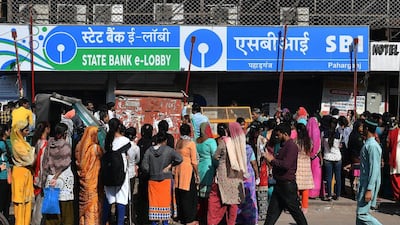The current cash crunch in India is causing immense hardship to citizens across income levels (Changing rules infuriate Indians coping with currency shock, November 26). It's more painful for people living in rural areas where the banking system is not strong. Even foreign tourists and business visitors are suffering.
While the government has done well to provide some exceptions permitting the use of the old 500-rupee notes only for some specific purposes, there is need for more relief.
The scheme permitting citizens to exchange 2,000-rupee notes at banks and post offices should be continued.
Many Indians in small commercial activities need money every day for household expenses. Many of them do not have bank accounts. Some are illiterate and cannot even sign. Even if they wish to open a bank account, it will take 10 to 15 days. What will these people do for the next two weeks if they cannot change their money?
The government has permitted the use of 500-rupee notes only at petrol stations until December 15. Why not 1,000-rupee notes?
The new notes should be available in abundance. Unfortunately, that’s not happening.
Use of the old currency should be permitted at restaurants, private hospitals, bookshops and educational institutions to reduce the suffering of common people.
Rajendra K Aneja, Dubai
UK can follow Trump example
Donald Trump intends to bring in immediate legislation to enact tighter restrictions on Washington’s so-called “revolving door” by proposing a five-year ban on members of Congress and executive branch officials who want to become lobbyists after leaving government.
Mr Trump also proposes a lifetime ban on senior executive branch officials from lobbying for foreign governments and will call upon Congress to restructure campaign finance laws to prevent lobbyists employed by foreign states from raising money for any political party or candidate for election in the United States.
In Britain today, there is little or virtually no restriction on government officials from becoming paid lobbyists or agents for foreign firms and/ or foreign governments. Such arrangements invariably lead to conflicts of interest and potentially dangerously split loyalties.
The UK should go even further than Washington by bringing in legislation requiring formal registration of all lobbyists who act in the interests of or for any foreign state, as “foreign agents”, and to restrict their activities in relation to any proposed or existing legislation or government business, all of which lobbying to be transparent and open to official scrutiny and placed in the public domain.
The members of a national legislature and executive are obliged to work in the interests of the electorate and not for their own personal financial or other gain or for the benefit of a foreign state. This is a requirement that should be enshrined in law.
Anthony Bellchambers, UK
Agriculture initiative is great
I applaud the initiative of The National and Grow Your Food (From seed to harvest: some essential advice for gardeners in the UAE, November 25). Growing some of the food we need is the way ahead and great fun as well with a high level of satisfaction.
Deirdre Hamilton Stewart, Abu Dhabi
Why go after celebrities?
In response to Your guide to celeb spotting during the Abu Dhabi Grand Prix weekend (November 23), I hope to see none of these celebrities unless they want to contribute to society in a manner that helps and provides.
Tom Richardson, Abu Dhabi
If I were lucky enough to be there, I would hope to see all the wonderful friends I had in Abu Dhabi, of all creeds, races and nationalities, and nobody at all from the gossip magazines. Real people.
Bob Myerscough, UK

